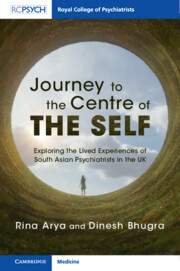 Journey to the Centre of the Self
Journey to the Centre of the Self from Part I - Contextual Information
Published online by Cambridge University Press: 04 October 2024
This chapter gives an overview of the history of migration from South Asia to the UK, and develops ideas found in the interviews with the psychiatrists and subsequent analyses. It is not meant to be comprehensive but provides a contextual background from which to situate the experiences and life journeys of migrant South Asian doctors. The postwar migration of labour from commonwealth countries transformed UK’s cultural landscape. Migration is a complex, multifactorial process, that involved experiences of loss on different levels. Over the course of time stricter legislation has seen changes to patterns of migration on different bases. This needs to be viewed against globalisation which has a different bearing on migration. The growth of transnational, mobile identities means that migrants can interact in more networked worlds making travel and communication more accessible both for migrants and their extended family. It has made it possible to occupy different spaces and identities both locally and globally. South Asian doctors who come to the UK today have been impacted by a number of factors such as changes to immigration policies and the global effects of the Covid−19 pandemic. These factors have to be considered amongst others that influence choices about migration including economic opportunities, the provision of jobs, the growth of healthcare systems and development of infrastructure in their home countries.
To save this book to your Kindle, first ensure no-reply@cambridge.org is added to your Approved Personal Document E-mail List under your Personal Document Settings on the Manage Your Content and Devices page of your Amazon account. Then enter the ‘name’ part of your Kindle email address below. Find out more about saving to your Kindle.
Note you can select to save to either the @free.kindle.com or @kindle.com variations. ‘@free.kindle.com’ emails are free but can only be saved to your device when it is connected to wi-fi. ‘@kindle.com’ emails can be delivered even when you are not connected to wi-fi, but note that service fees apply.
Find out more about the Kindle Personal Document Service.
To save content items to your account, please confirm that you agree to abide by our usage policies. If this is the first time you use this feature, you will be asked to authorise Cambridge Core to connect with your account. Find out more about saving content to Dropbox.
To save content items to your account, please confirm that you agree to abide by our usage policies. If this is the first time you use this feature, you will be asked to authorise Cambridge Core to connect with your account. Find out more about saving content to Google Drive.